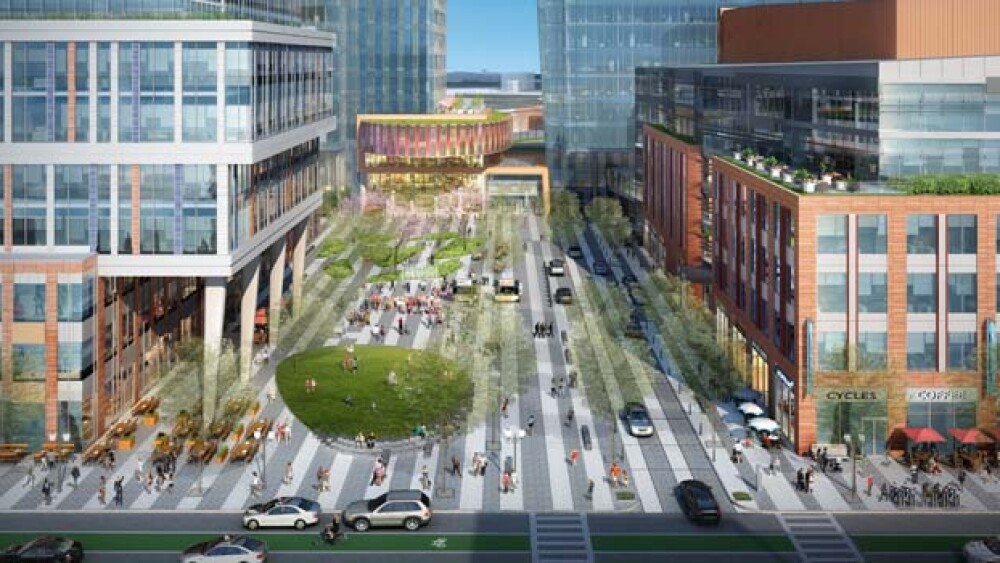The new space is located just a few miles from Kendall Square that has become the hub of the Boston biotech industry.
BOSTON – A new life sciences development that could provide office and laboratory space for multiple companies is taking off the Boston’s South End neighborhood as an alternative Cambridge’s pricey Kendall Square.
The Abbey Group is developing 5.6 acres in what the company describes as the ideal life sciences complex for the greater Boston area. The new space is located just a few miles from Kendall Square that has become the hub of the Boston biotech industry.
Although nothing has yet been finalized, preliminary plans for the complex known as Exchange South End call for four buildings that surround 1.5 acres of greenspace that will be called Albany Green.
The buildings will include space for laboratories and offices for life science companies, as well as 80,000 square feet of retail and culture space for the employees on the campus and the surrounding neighborhood. In total, the complex will include 1.6 million square feet of space for companies, with about to 840,000 square feet of dedicated laboratory space.
The characteristics of the South End neighborhood will serve as a keystone for the Exchange South End development.
“The South End is one of Boston’s most dynamic neighborhoods,” Audrey Epstein-Reny, managing director at The Abbey Group, told BioSpace in an exclusive interview. “The South End neighborhood is known for its arts and culture and dining scene.”
With that in mind, Epstein-Reny said the site will include 30,000 square-feet of cultural space that will be “unique and interesting” and brings life to the campus outside of working hours.
The Abbey Group expects the development to provide an affordable option for startups and established companies that need dedicated work space. That will be good news for companies that want to be in the Boston area but need to pay close attention to the cost of real estate. Space in Kendall Square can go for about $80 per square foot. But that will not be the case for Exchange South End. Although Epstein-Reny said it was too early to announce what companies will pay per square foot, she said the space will be reasonable.
“This space will be cost competitive. We’ll certainly be able to beat the price of Kendall Square,” Epstein-Reny said.
Not only will the cost of the space be financially beneficial to companies, Epstein-Reny said the location of the campus is in near proximity to the city’s intellectual capital. The South End neighborhood is well situated near the Boston University Medical Campus, which Epstein-Reny said will be beneficial to companies.
The neighborhood will also be critical for companies who want to attract and maintain top talent, Epstein-Reny said. She said employees and employers will have the ability and live, work and enjoy in South End.
“It’s truly a live-work type of neighborhood,” she said.
The Abbey Group filed its design plans with the city and expects to be able to accommodate tenants in early 2020. The Abby Group has not begun marketing the space to potential tenants, but Epstein-Reny said they are in the early phases of “beginning to spread the word” about the project.
When construction begins on the project, Epstein-Reny said the will be able to design the space to meet the needs of any early tenants. The project will be built in a phased approach, she added.
“The park in the campus will be a beautiful and dynamic component of the campus that will have opportunities for tenants. It will have a lively and vibrant ground floor experience. We’re excited to get underway with it,” she said.
The price of prime life science real estate has become a problem for many companies. In the past, BioSpace has reported on the increasing real estate costs in these biotech hubs, and in the case of some cities, the shortage of space, which causes rent prices to increase.
Real estate developers have been building space in alternative areas to provide more affordable space to life science companies. In the Boston area, King Street Properties developed a 91,000 square-foot structure in nearby Lexington as an alternative for high-rent space in the Kendall Square area of Cambridge, Mass.





